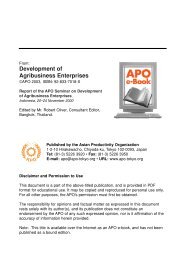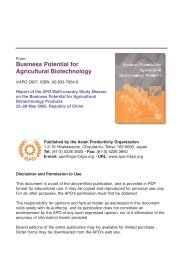Annual Report 2009 - Asian Productivity Organization
Annual Report 2009 - Asian Productivity Organization
Annual Report 2009 - Asian Productivity Organization
Create successful ePaper yourself
Turn your PDF publications into a flip-book with our unique Google optimized e-Paper software.
The APO organized a multicountry observational study<br />
mission on Waste Management in the Agroprocessing<br />
Industry, 16–19 June, to enhance participants’ knowledge<br />
of the development and use of environmentfriendly<br />
technologies in the agroprocessing sector and<br />
to share experiences and learn from the best practices<br />
in agroprocessing waste management in the host country.<br />
Sixteen participants from eight countries attended,<br />
with three local resource persons.<br />
Program coverage: Korean policy on food waste<br />
management—application of 3R concepts; Promotion<br />
of a comprehensive master plan for “waste-to-energy”;<br />
and Practice of food waste management. A field trip<br />
was made to Ultra Feedstuff Co., Ltd., a food wasteto-resource<br />
facility in Chunan; and Sudokwon Landfill<br />
Site Management Corporation.<br />
Seminar participant examining salak trees on a Sleman district<br />
farm, Yogyakarta AGRICULTURE SECTOR<br />
recommendations, a workshop on Applications of Nanotechnology<br />
in the Food Industry was organized by<br />
the APO and implemented by the FTPI, 15–19 June,<br />
in Bangkok. It was attended by 22 participants from<br />
eight member countries. Four APO resource persons<br />
were deputed and there were two local experts.<br />
Program coverage: Potential application of nanotechnology<br />
in the food industry; Labeling and regulations;<br />
Sharing of nanotechnology applications in the food<br />
industry: Experiences of multinational food industries;<br />
Challenges and opportunities in promoting nanotechnology<br />
applications in the food industry; Nanoparticle<br />
fabrication for the encapsulation of nutraceuticals<br />
by the RESS technique; Controlled-release delivery<br />
systems for nutraceuticals and functional foods; and<br />
Regulatory and institutional framework in safety of<br />
nanofoods to attract investment in nanotechnology applications.<br />
Site visits were made to: the National Science<br />
and Technology Development Agency Material<br />
Technology Lab, Biotechnology Lab, and Nanotechnology<br />
Lab; and Kasetsart University Nanotechnology<br />
Laboratory. Participants also attended the Food Innovation<br />
Asia Conference, part of ProPak Asia <strong>2009</strong>.<br />
Waste Management in the Agroprocessing Industry<br />
The processing activities of agroprocessors can<br />
generate waste if not properly designed and managed.<br />
These come in the form of liquid and solid waste that<br />
can be environmental health hazards. Some processing<br />
activities produce large amounts of effluents that<br />
contribute to the pollution of rivers and seas. More<br />
polystyrene foam or styrofoam materials and plastics,<br />
which are nonbiodegradable, are also used in the<br />
handling and marketing of processed products. Companies<br />
engaged in agroprocessing should incorporate<br />
waste management and environmental considerations<br />
in their business planning and operations to contribute<br />
to the eradication of health hazards and to mitigate<br />
environmental damage.<br />
Entrepreneurship and Agrotechnology/Agribusiness<br />
Incubation<br />
Agribusiness incubation accelerates the successful<br />
development of start-ups by providing entrepreneurs<br />
with various resources and services. Agribusiness<br />
incubators reduce risk and investment expenses<br />
and increase the success rate of start-ups. Incubator<br />
graduates can create jobs, revitalize neighborhoods,<br />
commercialize new technologies, and strengthen local<br />
and national economies. The concept of agrotechnology/agribusiness<br />
incubation is, however, relatively new<br />
to most <strong>Asian</strong> countries.<br />
Recognizing the crucial role of technology/business<br />
incubation in promoting innovation in agriculture<br />
and modernizing traditional SME operations into<br />
technology-based ones, the APO deputed a study<br />
mission on Entrepreneurship and Agrotechnology/<br />
Agribusiness Incubation to the Republic of China,<br />
22–26 June. The objective was to learn from the rich<br />
experience of the host country in technology/business<br />
incubation. The CPC and National Chung Hsing<br />
University (NCHU), with support from the Council of<br />
Agriculture (COA), Executive Yuan, implemented the<br />
mission. Twenty-two participants from nine member<br />
countries attended, along with two overseas and three<br />
local resource persons.<br />
Program coverage: Entrepreneurship and agribusiness/agrotechnology<br />
incubation in the Asia-<br />
Pacific region; Agripreneur incubation—an evolved<br />
approach to facilitating the viability of agribusiness<br />
entrepreneurs; Institutional and policy arrangements<br />
in the Republic of China for the promotion of agrotechnology/agribusiness<br />
incubators; and Creating a<br />
conducive environment for promoting agrotechnology/<br />
agribusiness incubation. To observe agrotechnology/<br />
agribusiness incubation operations, the participants<br />
visited eight sites: Innovation Incubator of the NCHU<br />
APO ANNUAL REPORT <strong>2009</strong> 45
















